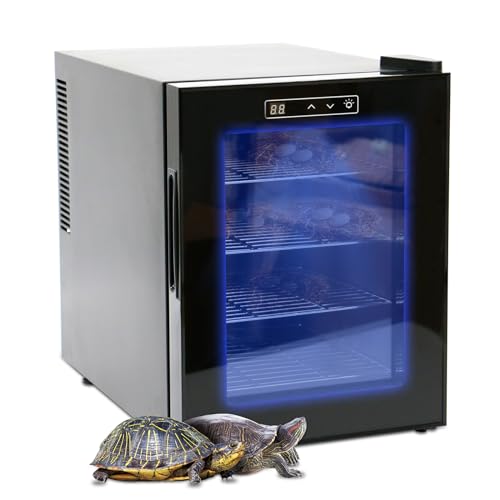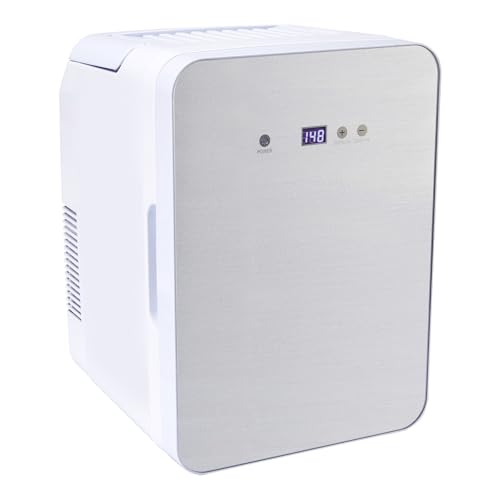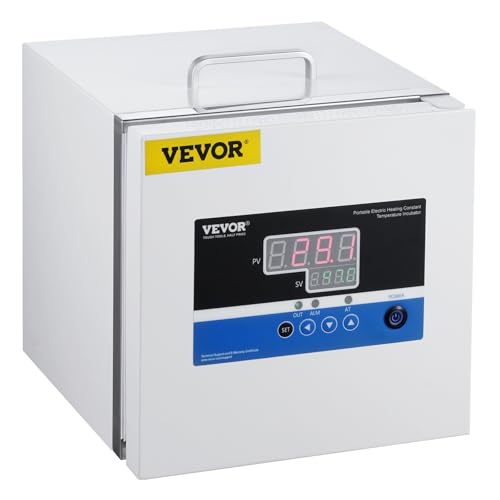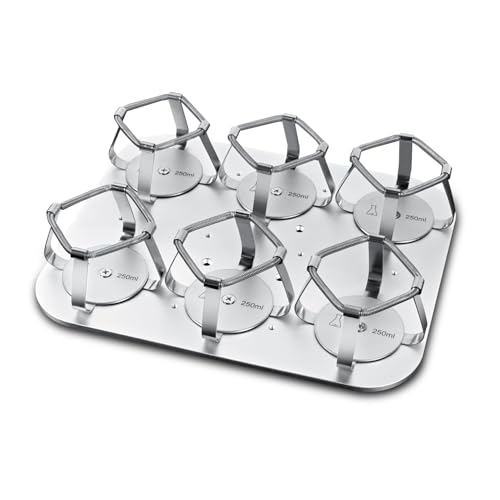As you explore the essential tools for your research in 2025, you’ll find that choosing the right bench lab incubator is vital. These instruments offer precise temperature control and energy efficiency, tailored to various experimental needs. With options ranging from compact designs to customizable shelving, there’s an incubator for every application. Curious about which models stand out in this competitive market? Let’s take a closer look at the top contenders.
Reptile Incubator 16L for Small Reptiles
If you’re looking for a reliable incubator for your small reptiles, the Reptile Incubator 16L is an excellent choice. This digital incubator features both heating and cooling capabilities, with a temperature range of 50°F to 104°F. You can easily adjust temperatures using the touch screen control panel, ensuring a consistent environment within +/- 2°F. The visible glass door lets you monitor conditions, while LED indicators keep you informed of power and refrigeration status. Just remember to place it away from direct sunlight and high humidity for ideal performance. Customer feedback varies, so consider potential concerns before purchasing.
Best For: Those seeking a digital incubator for small reptiles that offers both heating and cooling functionalities.
Pros:
- Easy temperature adjustments via a touch screen control panel.
- Visible glass door and LED indicators allow for easy monitoring of conditions.
- Can be used for transporting reptiles or amphibians.
Cons:
- Mixed reviews on performance and reliability, with concerns about temperature consistency.
- Reports of condensation affecting the touch screen functionality.
- Limited return policy and inadequate support for malfunctioning units.
IVYX Scientific 5L Incubator – Precise Temperature Control
The IVYX Scientific 5L Incubator stands out for its precise temperature control, making it an excellent choice for researchers and hobbyists alike who require reliability in their experiments. With a temperature range from 0°C to +55°C in 1°C increments, it guarantees accurate conditions for your work. Plus, the temperature gradient remains minimal at 0.5°C, offering consistency throughout. Its compact design and lightweight build make it easy to place or transport, whether you’re in the lab or on the go. Ideal for yeast cultivation or various scientific projects, this incubator combines versatility with dependable performance.
Best For: Researchers and hobbyists who require precise temperature control for experiments or yeast cultivation.
Pros:
- Versatile functionality allows it to be used as both a refrigerator and a warm incubator.
- Compact design makes it easy to transport and fit in small spaces.
- Accurate temperature control with minimal fluctuations ensures reliable conditions for various applications.
Cons:
- Limited capacity of 5L may not be suitable for larger projects or multiple samples.
- Temperature range may not accommodate extreme conditions beyond 0°C to +55°C.
- Customer support and warranty information need to be requested, which may delay assistance.
10L Bacteria Incubator for Lab General Purpose
Designed for versatility and efficiency, the 10L Bacteria Incubator for Lab General Purpose is an ideal solution for researchers, educators, and hobbyists alike. You’ll appreciate its professional temperature control, automatically activating when the temperature exceeds your setpoint by 2°C. Achieving thermal equilibrium in just 20 minutes, it maintains minimal variations between shelves. Built from industrial-grade ABS, this incubator is robust and easy to clean. With removable shelves, it accommodates various vessels. Plus, its dual-layer silicone gasket reduces thermal loss. Whether for bacterial cultivation or egg incubation, this incubator meets diverse needs while ensuring consistent results.
Best For: Researchers, educators, and hobbyists looking for a reliable incubator for bacterial cultivation and other temperature-sensitive applications.
Pros:
- Professional temperature control ensures precise regulation and minimizes fluctuations for consistent results.
- Robust construction with industrial-grade ABS material makes it easy to clean and durable for long-term use.
- Versatile design with removable shelves accommodates various laboratory vessels, enhancing its utility across different applications.
Cons:
- Limited capacity of 10L may not be suitable for larger scale operations or extensive experiments.
- Additional temperature adjustment required (adding 5°C to the target) may lead to confusion for new users.
- Temperature variations between shelves of ±0.3–0.6°C could impact experiments requiring extremely precise conditions.
VEVOR Lab Incubator, 6L, PID Temperature Control
For researchers seeking a compact yet efficient solution, the VEVOR Lab Incubator with its 6L capacity stands out as an ideal choice. Designed for microbiological applications, it excels in biological culture, cell culture, and microorganism propagation. Constructed from durable cold-rolled steel and stainless steel, this incubator guarantees longevity. Its intelligent PID temperature control allows precise adjustments within ± 2℃, with a heating range of RT+5-65℃ for stability. The thermal convection system evenly distributes warm air, creating favorable conditions. However, be aware that some users faced issues with unhelpful instructions and damaged doors upon delivery, despite solid packaging.
Best For: Researchers and microbiologists seeking a compact incubator for biological culture and microorganism propagation.
Pros:
- Durable construction with cold-rolled steel exterior and stainless steel interior ensures longevity.
- Intelligent PID temperature control allows for precise adjustments and maintains stability within ± 2℃.
- Thermal convection system guarantees even temperature distribution for optimal growth conditions.
Cons:
- Some users reported unhelpful instructions that may hinder setup and operation.
- Issues with damaged doors upon delivery, despite good packaging, have been noted by some customers.
- Limited capacity of 6L may not meet the needs of larger scale research applications.
VEVOR Lab Incubator 20L for Bacterial Culture and Seed Germination
Engineered for precision and reliability, the VEVOR Lab Incubator 20L stands out as an excellent choice for researchers focused on bacterial culture and seed germination. Constructed from high-quality steel with a 304 stainless steel inner tank, it guarantees durability and safety. Its intelligent PID temperature control provides fast and stable management, while the digital display makes monitoring easy. With a thermal convection system, you’ll enjoy uniform temperature distribution, heating samples up to 65°C efficiently. Ideal for agricultural and scientific research, this incubator meets diverse needs in universities and colleges, making your experiments more effective and reliable.
Best For: Researchers and students in agricultural and scientific fields requiring reliable temperature control for bacterial culture and seed germination.
Pros:
- High-quality construction with durable steel and 304 stainless steel inner tank for longevity.
- Intelligent PID temperature control ensures fast and stable temperature management for accurate results.
- Uniform temperature distribution through thermal convection system enhances experiment reliability.
Cons:
- Limited capacity of 20L may not be sufficient for larger experiments or samples.
- Initial setup may require calibration and adjustment for optimal performance.
- The price point may be higher compared to basic incubators without advanced features.
Quincy Lab 10-140 Analog Incubator
The Quincy Lab 10-140 Analog Incubator stands out as an ideal choice for researchers and professionals needing reliable temperature control for biological samples and cultures. With a temperature range of ambient +2 to 62 degrees Celsius, it guarantees your samples remain stable within +/- 0.75 degrees Celsius at 37 degrees. Its compact design features a durable exterior and tinted acrylic door for safety. You’ll appreciate the bimetal controller for precise adjustments. The incubator includes two shelves for customization, making it versatile for various applications. Compliance with UL standards further confirms you of its reliability in clinical and academic settings.
Best For: Researchers and professionals in clinical, industrial, and academic settings who require precise temperature control for biological samples and cultures.
Pros:
- Durable construction with a cold-rolled steel exterior and aluminum interior for longevity.
- Compact design with customizable shelving options to accommodate various sample sizes.
- Stable temperature control with a bimetal controller ensuring accuracy within +/- 0.75 degrees Celsius.
Cons:
- Limited temperature range compared to some advanced incubators on the market.
- Analog controls may not offer the precision and convenience of digital interfaces.
- The shipping weight of 25 lbs could be cumbersome for some users when moving or relocating the unit.
Erlenmeyer Flask Rack, Orbital Shaker Rack, Benchtop Incubator Shaker Rack (P6-250)
When it comes to maximizing efficiency in your laboratory, the Erlenmeyer Flask Rack P6-250 stands out as an essential tool for researchers. This rack comfortably holds six 250 mL Erlenmeyer flasks, ensuring stability and safety during vigorous shaking. Its secure grip prevents spills, making it perfect for larger culture volumes. Widely utilized in microbiology and cell culture studies, this rack is compatible with the DIS-60 system. Pair it with the Orbital Shaker Rack or Benchtop Incubator Shaker Rack for enhanced performance. By incorporating the P6-250, you’ll streamline your experiments and improve overall lab productivity.
Best For: Researchers in microbiology and cell culture studies who require secure and efficient shaking of larger culture volumes.
Pros:
- Secure grip prevents spills during vigorous shaking, ensuring safety and stability.
- Accommodates six 250 mL flasks, enhancing productivity by allowing multiple samples to be processed simultaneously.
- Compatible with DIS-60, making it versatile and easy to integrate into existing laboratory setups.
Cons:
- Limited to 250 mL flasks, which may not be suitable for all laboratory needs.
- May require additional equipment like an Orbital Shaker Rack or Benchtop Incubator Shaker Rack for optimal performance.
- Size and weight may hinder portability within smaller lab environments.
Quincy Lab 12-140E Acrylic Door Digital Incubator
For researchers seeking a compact yet efficient incubator, the Quincy Lab 12-140E Acrylic Door Digital Incubator stands out with its precise temperature control. With a capacity of 2.0 cubic feet and a temperature range from ambient +2°C to 62°C, it accommodates up to 13 items comfortably. The digital PID microprocessor guarantees temperature accuracy within ±0.5°C, making it reliable for sensitive experiments. Constructed from high-grade aluminum and powder-coated CR steel, the incubator features a see-through bronze acrylic door for easy monitoring. Its natural gravity convection heating system further enhances its performance, making it an ideal choice for your research needs.
Best For: Researchers and laboratories needing a compact and precise incubator for temperature-sensitive experiments.
Pros:
- Precise Temperature Control: Digital PID microprocessor ensures temperature accuracy within ±0.5°C.
- Compact Design: 2.0 cubic feet capacity allows for efficient use of space while accommodating up to 13 items.
- Durable Construction: Made from high-grade aluminum and powder-coated CR steel for longevity, with a see-through bronze acrylic door for easy monitoring.
Cons:
- Limited Capacity: May not be suitable for larger experiments or high-volume applications due to its 2.0 cubic feet capacity.
- Natural Convection: Heating method may result in uneven temperature distribution compared to forced air convection systems.
- Single Adjustable Shelf: Limited shelving options can restrict organizational flexibility within the incubator.
IVYX Scientific 25L Incubator
With precise temperature control ranging from 2°C to 60°C, the IVYX Scientific 25L Incubator stands out as an ideal choice for researchers and hobbyists alike. You’ll appreciate its ability to cool down approximately 20°C below ambient temperature and heat up efficiently, boasting minimal fluctuations of just 0.5°C. This versatile incubator also serves as both a refrigerator and a warm incubator, making it perfect for various projects, including yeast growth for sourdough bread. Compact yet spacious, it weighs only 16 lbs. Plus, with a standard power cord and a 12V car adapter, you can take it anywhere with ease.
Best For: Researchers and hobbyists looking for a versatile incubator for temperature-sensitive projects, such as yeast growth for sourdough bread making.
Pros:
- Precise temperature control with minimal fluctuations, ensuring reliable results.
- Dual functionality as both a refrigerator and warm incubator, enhancing versatility for various applications.
- Compact design and lightweight for easy portability, making it ideal for on-the-go use.
Cons:
- Limited internal space may not accommodate larger projects or equipment.
- Temperature range may not meet the needs of all specialized scientific applications.
- Cooling capabilities may be insufficient in extremely high ambient temperatures.
Incubator Shaker, Benchtop Orbital Shaker (DIS-60E)
The Incubator Shaker, Benchtop Orbital Shaker (DIS-60E) stands out as the ideal choice for researchers needing a compact and efficient solution for incubating and shaking samples simultaneously. With a temperature control range from R.T. +5 to 60℃ and a shaking speed of 200 to 1200 rpm, it accommodates up to four 96-well plates. Its user-friendly touch-tone interface and built-in timing function make operation effortless. Plus, the unique speed control circuit guarantees no spills during startup. The compact design not only saves lab space but also assures good temperature uniformity and low noise levels, enhancing your research experience.
Best For: Researchers and laboratories seeking a compact and efficient incubator shaker for simultaneous sample incubation and shaking.
Pros:
- Integrated design saves valuable lab space while providing dual functionality.
- User-friendly interface with touch-tone operation and built-in timing for ease of use.
- Unique speed control circuit prevents spills during startup, ensuring safe operation.
Cons:
- Limited capacity of four 96-well plates may not meet the needs of larger experiments.
- Temperature range may not be suitable for all types of samples requiring lower temperatures.
- Compact structure might lead to heat concentration if not adequately ventilated.
Factors to Consider When Choosing a Benchlab Incubator
When you’re choosing a bench lab incubator, it’s essential to contemplate several key factors. Temperature control precision, capacity, and portability can greatly influence your research outcomes. Additionally, energy efficiency and construction quality will affect both your budget and the incubator’s longevity.
Temperature Control Precision
Temperature control precision plays an essential role in achieving reliable results in your research, especially when working with sensitive biological cultures. Look for incubators that maintain temperature fluctuations of ±0.5°C or less, as this level of accuracy is crucial for consistent outcomes. Some models may offer control within ±2°F, which could jeopardize the viability of your samples. High-quality incubators typically feature advanced PID control technology, minimizing temperature overshoot and ensuring stability. Effective circulation systems, like thermal convection, promote uniform temperature distribution, reducing gradients that might skew results. Additionally, opt for models that provide real-time temperature monitoring through digital interfaces, enhancing your awareness and control over the incubator’s performance.
Capacity and Size
Achieving accurate temperature control is only part of the equation in selecting the right bench lab incubator; capacity and size are equally important factors. You’ll find that incubators come in various sizes, from compact 5L models for specific tasks to versatile 20L units that handle diverse samples. Consider your workspace—both the external dimensions for placement and the internal capacity for your samples. Smaller incubators are perfect for tasks like incubating yeast, while larger ones are ideal for bacterial cultures and multiple sample types. Don’t overlook the weight, as heavier units may be stationary. Choosing the right capacity guarantees ideal temperature stability, preventing overcrowding that could compromise sample integrity. Make sure your incubator fits your research needs!
Portability Features
Portability features are essential for bench lab incubators, making it easy for you to transport and set up your equipment wherever your experiments take you. Look for incubators with dual power options, like standard AC cords and 12V car adapters, so you can use them in both labs and field settings. A compact design with a small footprint saves valuable lab space while still accommodating your samples or cultures. Additionally, some incubators come with top handles or lightweight construction, enhancing mobility between work areas. User-friendly controls and covers that open widely also add to the convenience, ensuring you can operate your portable incubator effortlessly in diverse environments. Choose wisely to maximize your research flexibility!
Energy Efficiency
When choosing a bench lab incubator, energy efficiency should be a top priority, as it can lead to significant cost savings on your electricity bills. Look for models that feature advanced heating systems and thermal insulation to minimize energy consumption while providing stable temperatures. PID temperature control technology is another plus, ensuring precise regulation without wasting energy. Opting for a compact design can further enhance energy savings by reducing the space that requires heating or cooling. Many energy-efficient incubators boast cooling and heating capabilities that can save you 20-30% more energy compared to traditional models. Prioritizing these features will not only help your budget but also contribute to a more sustainable lab environment.
Construction Quality
Energy-efficient incubators can enhance your lab’s overall functionality, but their performance largely hinges on construction quality. When choosing an incubator, consider the construction materials. Industrial-grade ABS offers robust performance, while cold-rolled steel resists high temperatures and aging. Stainless steel interiors are ideal for better corrosion resistance and easy cleaning, essential in lab environments. Look for designs featuring dual-layer silicone gaskets to minimize thermal loss and maintain stable temperatures. A transparent or tinted door lets you monitor the incubation environment without disruption. Finally, assess the overall build quality, including adjustable shelves and sturdy handles, as these factors impact usability and flexibility for various applications. Investing in quality construction guarantees reliable performance for your research needs.
Versatility of Use
Choosing a bench lab incubator that offers versatility can greatly enhance your research capabilities. Look for an incubator that functions as both a refrigerator and a warm incubator, catering to various applications from bacterial cultures to yeast growth for baking. Temperature control is critical—opt for models that allow precise adjustments in small increments, like 1°C, for different experiments. The incubator should support multiple applications, such as microbial cultivation, egg incubation, and plant propagation, broadening its usability. Portability features, including a 12V car adapter, are necessary for fieldwork. Finally, verify it maintains consistent temperature distribution with minimal fluctuations (e.g., ±0.5°C), which is essential for sensitive biological samples.
User Interface Design
A well-designed user interface can greatly enhance your experience with a bench lab incubator, building on the versatility it offers. Look for a user-friendly interface with clear controls and displays, making temperature adjustments and monitoring conditions easy. Touch screen control panels can provide intuitive navigation and real-time feedback, markedly improving your experience. LED indicators for power and operational status let you assess functionality at a glance. Consider models with visible glass or transparent doors, allowing you to monitor the internal environment without opening the incubator, which helps maintain temperature stability. Finally, prioritize safety features like alerts for temperature fluctuations or operational failures to guarantee consistent and reliable performance during your research.









